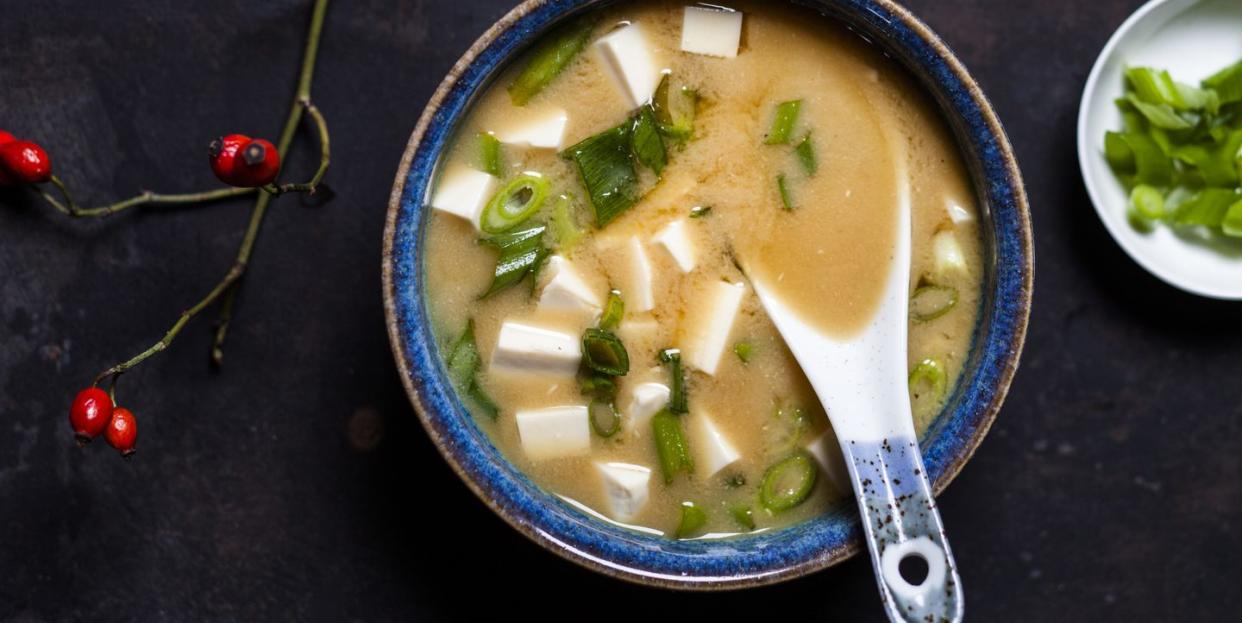5 Incredible Health Benefits of Miso

When you hear the word “miso,” you’re probably most familiar with the light-yet-umami-packed soup, but this Asian ingredient actually does much more than prime your palate for a sushi feast. “Miso is a fermented condiment that is an integral part of Asian cooking, and since it’s a fermented food made from soybeans, it contains probiotics that support good gut health, and it’s also rich in essential vitamins and minerals,” says Laura Iu, R.D., a registered dietitian nutrition and certified intuitive eating counselor in New York City. Here’s why you should (and how to) make it part of a good-for-you diet.
It’s good for your belly.
Miso contains a particular strain of probiotics that supports your gut’s natural good-bug bad-bug balance. “Aspergillus oryzae is a probiotic strain found in miso, and it’s created during the fermentation process,” says Janice Chow, M.S., R.D., registered dietitian and founder of The Mindful Chow, LLC. Koji is a fungus that serves as a fermentation starter, and when combined with soybeans and salt, probiotic-rich miso is born. Balanced belly bacteria promotes good digestion and helps prevent gastro distress such as gas, diarrhea, constipation, and bloating, Chow adds.
It supports immunity.
“Much of your immune system is housed in the gut, so the probiotics in miso help keep your immune system running strong,” says Elizabeth Shaw, M.S., R.D.N., owner of Shaw’s Simple Swaps. Miso works well in dressings, sauces, and marinades, says Shaw, so try using it to flavor-boost a leafy salad or roasted veggies like Brussels sprouts or root vegetables.
It’s a brain-builder.
Choline and B-vitamins such as niacin and folate support cognitive function and development, and miso has all three, says Chow. Choline also plays a role in nervous system functions such as memory, muscle control, and mood. Here’s a cool trick: Tone down the sugar content and the sweetness of baked goods by adding white miso to the recipe. “I’ve baked with white miso many times and love the nutty aroma it adds to baked goods,” Chow says.
It promotes healthy blood.
Miso is rich in vitamin K, says Iu, which helps blood clot. If you’re on blood thinning medication, check with your doctor before incorporating miso into your diet, as it’s blood-clotting abilities may mess with those meds. Miso paste is great with meat, says Iu, but always dilute it with a little water, butter, or another type of sauce or marinade before spreading over your protein, otherwise the flavor will be too overpowering.
It’s a good source of electrolytes.
“Since miso does contain a decent amount of sodium, miso could be very beneficial to athletes who need to replenish their electrolyte stores,” says Shaw. Create a supercharged recovery meal by marinading a lean protein such as salmon in miso.
You Might Also Like


